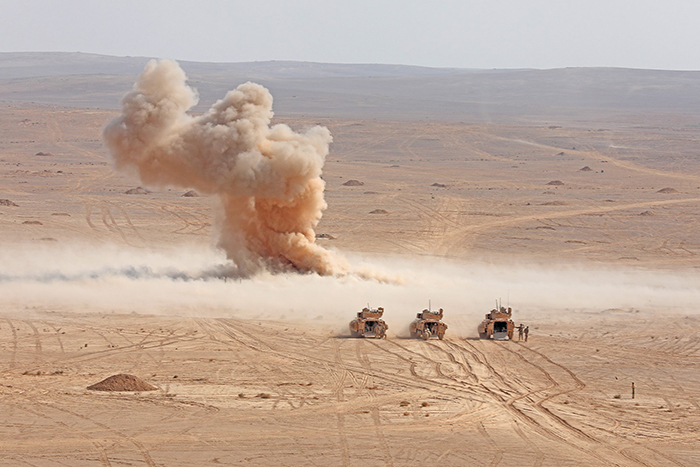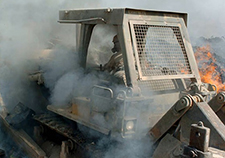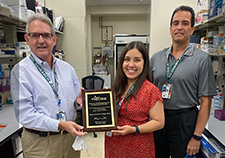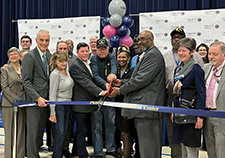Office of Research & Development |
 |


Military forces detonate Bangalore torpedoes during 2019 Eager Lion, a U.S. Central Command military exercise in Jordan. (Photo for illustrative purposes, taken by Army Sgt. Liane Hatch.)
July 25, 2023
By Erica Sprey
VA Research Communications
"Project IN-DEPTH has employed Gulf War Veteran advisors throughout the planning and onset of the study."
In April 2023, VA and the National Institutes of Health announced a joint, five-year study called Project IN-DEPTH, which aims to apply new research methods to explain the chronic symptoms of Gulf War Illness. The large response from the Gulf War Veteran community was well beyond any expectations though.
More than 400 Veterans contacted the study team after news of the partnership effort was released, interested in learning more. Many volunteered, some expressed hope for treatment in the future, and some expressed frustration over how they were treated in the past.
Researchers in the study are dedicated to reflecting the interests of each Veteran they hear from as they look for ways develop better diagnostic criteria, new testing procedures, and potential treatments for Gulf War Illness.

VA Study Documents Health Risks for Burn Pit Exposures

VA center training the next generation of researchers in blood clots and inflammation

AI to Maximize Treatment for Veterans with Head and Neck Cancer

VA opens new research center to seek novel arthritis treatments
Gulf War Illness affects multiple systems in the body and includes long-term symptoms such as fatigue, headache, memory difficulties, joint and muscle pain, poor sleep, and problems with breathing and digestion. The disease affects about a third of the nearly 700,000 men and women who served in the Persian Gulf during Operations Desert Shield and Desert Storm.
Interested Gulf War-era Veterans (who served in Southwest Asia between 1990-1991) are screened virtually through one of three locations: the Miami VA Medical Center, the VA War Related Illness and Injury Study Center (WRIISC) in Palo Alto, California, and the WRIISC in Washington, D.C. Veterans who are eligible for the study will then be referred to NIH for comprehensive testing conducted over a two-week period.
To find out more about the IN-DEPTH study, visit the “Who can enroll?” webpage. Those with questions can contact the study team directly by e-mailing vhawas.indepth@va.gov.
Historically, Gulf War Illness has been widely misunderstood. In fact, VA refers to the disease as a “medically unexplained illness” because its symptoms vary so widely. That uncertainty has led many Gulf War Veterans to become dissatisfied with the care they received, but that frustration is one of the elements the study team is working hard to change.
“Project IN-DEPTH has employed Gulf War Veteran advisors throughout the planning and onset of the study. This has shaped the approach we intend to offer all Veterans who are enrolled in our study,” said Dr. Michelle Costanzo, director of research at the Washington, D.C., WRIISC. “We have taken great care to evaluate which research results could be important to clinical care for Veterans, and we will offer a primary care follow-up visit for all Veterans who complete the study.”
The study team plans to establish a data repository that will allow other researchers to analyze protected information that is compiled through the IN-DEPTH study. Data will include Department of Defense records, VA medical records, and objective exposure data. An important goal of the study is to recruit Gulf War Veterans whose documented symptoms began during or close to the time of their deployment to the Gulf.
Investigators are taking an innovative approach by conducting “deep phenotyping” of study participants. In medicine, deep phenotyping means looking at how different parts of the body function and interact with one another to describe the illness or health of a person. It is a process that allows researchers to precisely examine the underlying factors of a disease.
With studies focused on Gulf War Veterans since the mid to late 1990s, VA research has already led to insights on the possible causes of Gulf War Illness, treatments to address symptoms, and improvements in quality of life. However, there are still more questions that need to be answered. Eligibility for benefits also remains a critical concern for Gulf War Veterans.
Prior to 2022, VA considered six health conditions to be “presumptive” for Gulf War Illness — meaning qualifying Veterans did not have to prove a connection between their military service and illness to receive disability benefits. They are: myalgic encephalomyelitis/chronic fatigue syndrome, fibromyalgia, functional gastrointestinal disorders, and a group of undiagnosed illnesses. Now, the SFC Heath Robinson Honoring our Promise to Address Comprehensive Toxics Act, or the PACT Act, has expanded benefits and eligibility periods for toxic exposures.
VA has added more than 20 toxic exposure presumptive conditions based on the PACT Act. This change expands benefits for Gulf War-era and post 9/11 Veterans. In addition, all Veterans who are enrolled in VA health care will receive an initial toxic exposure assessment, and a follow-up screening every five years. It is important that Gulf War Veterans understand the unique aspects of their illness that establish services, even when the disease continues to be widely misunderstood. The PACT Act compliments research efforts, such as Project IN-DEPTH, which aim to better understand Gulf War Illness.
To learn more about care for toxic exposures, visit The PACT Act and your VA benefits or one of the additional resources listed below.
Gulf War Registry, Airborne Hazards and Open Burn Pit Registry - (Includes free health exam) Gulf War Registry Health Exam for Veterans - Public Health (va.gov)
War Related Illness and Injury Study Center (WRIISC) - War Related Illness and Injury Study Center Home (va.gov)
The VA Gulf War Newsletter - To subscribe and view past issues go to Newsletter Archive – Gulf War Newsletter - Public Health (va.gov)
The Million Veteran Program (MVP) - MVP has the largest cohort of Gulf War Veterans to date with research looking at self-report surveys, medical records, and genetic information in relation to Gulf War Illness. For more information go to https://www.mvp.va.gov/pwa/about
The MVP COVID Questionnaire - 1990-1991 Gulf War Veterans are encouraged to complete the questionnaire to give insight on the effects of COVID and/or the COVID vaccine on symptoms of Gulf War Illness. For more information go to https://www.mvp.va.gov/pwa/
The Research Advisory Committee on Gulf War Veterans’ Illnesses - Includes scientific meetings, Gulf War Veteran listening sessions, research alerts, etc. For more information go to https://www.va.gov/RAC-GWVI. To receive notice of meetings, send your contact information to VARACGWVI@va.gov.
Available Clinical Trials - Go to Home - ClinicalTrials.gov and search by keyword such as “Gulf War” or “Gulf War Illness” for a list of current studies and clinical trials.
VA Research Currents archives || Sign up for VA Research updates